Managing Money : Stable Dollar ‘Bullish’ for Stocks and Bonds
- Share via
The dollar, after three years of decline, appears to finally be stabilizing, thanks to recent drops in the U.S. trade deficit. That, experts say, is good news for stock and bond investors.
This past week, the greenback hit a six-month high against the Japanese yen and also gained relative to the West German mark. While few predict that the U.S. currency will rise much further, many experts now say that at least its massive drops may be finally over.
The key to a stable dollar “is that the U.S. trade deficit continues to go down,” said John D. Connolly, Dean Witter’s chief investment strategist. “But if it doesn’t, you will hear arguments for an even cheaper dollar.”
A stable dollar helps stocks and bonds in two major ways: First, it means that the value of dollar-denominated assets won’t be eroded by unfavorable currency translations. That will attract foreign investors. Second, a stable dollar is expected to help keep inflation down, which could prolong the aging U.S. economic expansion.
“It’s very bullish for bonds and stocks,” said John P. Dessauer, publisher of Dessauer’s Journal, an Orleans, Mass., investment newsletter.
Of course, investments will be affected by more than just the dollar in the coming months. Nonetheless, if you want to play a stable or rising dollar, here are several ways to do it:
- U.S. long-term Treasury bonds. “A stable or rising dollar opens up the likelihood of tremendous foreign interest in quality U.S. bonds, especially from Japanese investors,” A. Gary Shilling, a New York economic consultant, wrote in a recent report.
He noted that several Japanese brokerage firms have already successfully launched huge new mutual funds in Japan to invest in U.S. Treasury bonds. Others, he said, will probably follow.
Another attraction of U.S. long-term bonds: They are yielding far more than their foreign counterparts. The bellwether 30-year U.S. Treasury bond is currently yielding about 9%, versus only 5% for long-term Japanese bonds and about 6.25% for West German issues, said Charles I. Clough, chief investment strategist at Merrill Lynch.
Of course, there is no guarantee that U.S. interest rates won’t rise in the near term, hurting prices of U.S. bonds, particularly long-term issues.
What about foreign bonds? Analysts are mixed on their outlook. Mutual funds investing in them have been among the top performers of recent years, aided by favorable currency translations. A stable dollar may not hurt them much, some argue.
But if the dollar rises further, the value of foreign bonds will fall for U.S. investors. That already has happened in recent weeks.
“The real era of investing in foreign bonds is over,” Dean Witter’s Connolly contended.
- Capital spending stocks. With a stable dollar, U.S. exports should continue to grow, Connolly argues. That, in particular, will help companies benefiting from higher capital spending.
Particular capital goods stocks that Connolly likes include Caterpillar, the heavy equipment concern; Ingersoll-Rand, a diversified machinery producer; Morrison Knudsen, an engineering and construction firm; Fluor, also in engineering and construction; Trinity Industries, a rail car manufacturer, and Parker Hannifin and Trinova, both makers of hydraulics products.
- Selected foreign stocks. Foreign businesses exporting into world markets should be helped by a stable or rising dollar, newsletter editor Dessauer argues. The weaker dollar of recent years has made U.S. goods cheaper and foreign goods more expensive in world markets.
In particular, the weaker dollar hurt stocks in West Germany and the Netherlands, Dessauer said. West German stocks are down over 40% from their peak in 1986, hurt by investors who were afraid that the dollar would drop so low as to price German exports out of world markets, he said.
But “if the dollar isn’t going down anymore, they will have a chance to adjust,” Dessauer said. He likes the Germany Fund, a closed-end mutual fund that can be bought on the New York Stock Exchange. As for Dutch firms, he likes KLM Royal Dutch Airlines and Philips NV, the giant international electronics concern. Both are traded on the NYSE.
What if the dollar keeps rising? Many of the above bets may be off.
Foreign stocks, for example, will lose value due to unfavorable currency translations. And a sharply rising dollar also will hurt stocks of U.S. manufacturers, whose goods become more expensive overseas.
“There is a big difference between a stable dollar and an appreciating dollar,” Connolly said. “An appreciating dollar would be negative for lot of companies.”
But a stronger dollar could benefit financial services stocks, Merrill Lynch’s Clough argued. That is because a stronger dollar portends lower interest rates, in part because the Federal Reserve won’t feel compelled to boost rates to attract foreign investors to Treasuries to finance the U.S. budget deficit.
Financial stocks in recent years have done well when the dollar has risen, Clough said. Such was the case in 1981, 1984 and early 1985, when the greenback was soaring. In the late 1970s, when the dollar sagged, financial stocks slumped as well.
In particular, Clough likes stocks of regional banks in the industrial heartland or in the Southeast, such as Barnett Banks, Jacksonville, Fla.; Suntrust Banks, Atlanta; NCNB Corp., Charlotte, N.C., and National City Corp., Cleveland.
He also likes stocks of financially strong insurance firms, such as General Re, American International Group and Marsh & McLennan.
More to Read
Inside the business of entertainment
The Wide Shot brings you news, analysis and insights on everything from streaming wars to production — and what it all means for the future.
You may occasionally receive promotional content from the Los Angeles Times.










